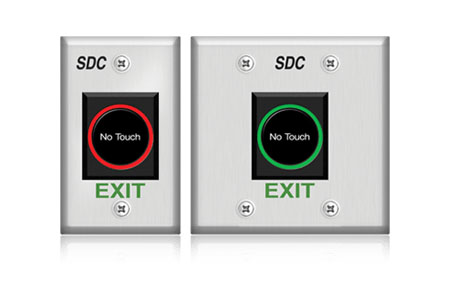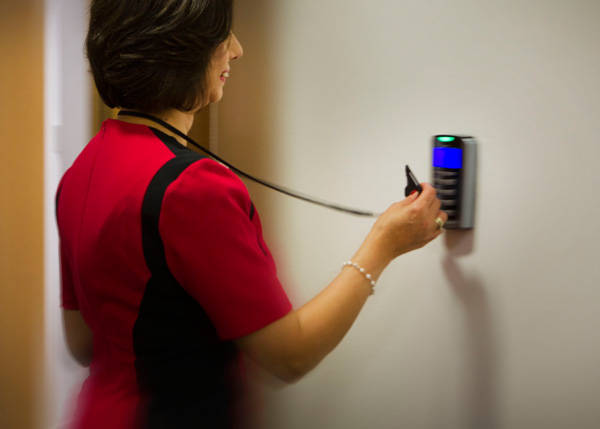Even if you’ve been living under a rock for the last month, you are no doubt aware of the COVID-19 outbreak and its effects on our everyday life. At both the federal and local levels, the government has issued suggestions for keeping ourselves and others as safe as possible during this difficult time. As a security provider, we always aim to help keep our customers as safe as possible. We do this by installing products designed to catch and thwart thieves and limit access to sensitive areas. However, many people do not know that we also install equipment designed to fight the spread of germs. In this post, we share how you can use both common sense and security equipment to create safer and healthier surroundings.
We will begin by looking at some valuable tips from the Centers for Disease Control and Prevention, or “CDC.” While designed specifically to combat the spread of the Coronavirus, they also work well as general health guidelines. From there, we will look at some unique security products designed to keep workplaces as sanitary as possible. First, we’ll explain how interactive alarm security monitoring services can help in this endeavor. From there, we’ll look at a few door-related security devices that make the workplace safer. In many offices, doors handles get touched dozens — if not hundreds — of times every day. This makes doors a perfect candidate for securing with anti-germ measures in mind. Let’s begin with a look at how the CDC recommends keeping yourself and others safe during our current pandemic.

Maintaining personal space and frequent hand-washing go a long way towards fighting the spread of germs and viruses.
Measures to Take to Keep You and Others Safe in Current Times
The CDC recommends taking several steps in order to stay as safe as possible during this time. These include measures to protect yourself as well as those around you. On the self-care side, washing your hands frequently and avoiding touching your face are top priorities. Additionally, avoiding close contact with others can help keep you away from dangerous germs.
In order to help keep others safe, the CDC has asked anyone feeling sick to stay at home. Common-sense measures such as covering your mouth when coughing and washing your hands immediately after coughs and sneezes can also help fight the spread of germs. You should also clean and disinfect door knobs and handles, keys, phones, and other frequently-touched items daily. For more tips to avoid getting or spreading the Coronavirus, read up on these suggestions on the CDC’s website. Now, let’s take a look at some security devices that can lower the risk of catching and passing illnesses.
Security Products That Fight the Spread of Germs
As a security integrator, we always try to find equipment that fits the needs of our customers. Now more than ever, security devices developed with the health of employees and the general public in mind make a big difference. Of course, even in times not marked by pandemic, we encourage business owners and landlords renting commercial spaces to tenants to keep health in mind when creating a security plan. In this section, we discuss some of our top security products that help fight the spread of germs. Let’s begin by looking at how interactive alarm monitoring services can help in this important area.
Interactive Alarm Services
A few months back, we created a post describing How Interactive Commercial Security Monitoring Can Add Security to Your Business. In that post, we focused on how this monitoring service helps control access to your business. Interactive cellular monitoring involves installing a cellular dialer to monitor your alarm system. This dialer creates consistent communication between your security system and our central station, without requiring a phone line. Therefore, if your business’s phone lines go down or get cut by a burglar, your alarm will still call for help if needed.

Touchless exit switches, such as these models by Security Door Controls, activate automatic door operators and allow users to operate doors without touching them.
Additionally, our cell dialer powered by Alarm.com allows users to use their smartphones to control the alarm system from anywhere, at any time. Furthermore, business owners can receive alerts based on alarm activity. These include alerts relating to any security system-related events, including alarm activations and arming and disarming notices. On an employee health level, this allows employees to control the security system without touching the keypad. Viruses often get transmitted over surfaces that get touched by many hands. Therefore, controlling an alarm system without touching the keypad takes one major common surface out of the equation. Next, we’ll focus on another device that keeps hands off of a workplace surface known for carrying germs.
Hands-Free Door Operators
As we pointed out earlier, the CDC recommends sanitizing door handles and knobs daily. However, in commercial settings, doors get handled so frequently that we recommend taking additional precautions. The next few security measures involve installing hardware to make your doors a less likely place to spread a virus around the office. For starters, hands-free door operators allow users to operate doors with the wave of a hand. These operators communicate with sensors to detect when people need to use a door, and swing the door open without the need for users to touch the door itself.
Users control doors by waving their hands in front of an exit switch sensor, such as the sensors pictured. These sensors use the same infrared technology as the motion detectors we install as part of a security system. Once detecting this motion, the sensor sends a signal to activate the automatic operator. At this point, the door opens for a short period of time and then swings shut. Let’s look at another type of system that can work with automatic door operators to make commercial door operation safer.
Access Control Systems
Access control systems add security to businesses in many unique ways. These systems utilize electronic locking hardware to control who has access to different doors of a business. Workers gain access by using a credential to activate the electronic hardware. These credentials can take the form of a keypad code or a biometric scan — for example, scanning a fingerprint or palm. However, the most popular means of entry involves swiping a credential in front of a proximity (or “prox”) reader. The credential itself can take the form of a card or fob. Additionally, Bluetooth-enabled readers even allow employees to use scan their phones as a credential!

Access card readers, such as this one made by AMAG, can be combined with automatic door operators to allow for completely touch-free unlocking and opening of doors.
So how do these systems help fight the spread of germs? Well, when used in conjunction with automatic door operators, these systems can do a lot. Scanning a phone, card, or fob to enter a door controlled by an automatic operator can allow employees to enter exterior doors and other important doors in the office without touching the door to open it with a key. This allows for completely hands-free operation even of doors that stay locked all day! Check out our post on The How, Where, When, and Why of Access Control to learn more about these systems. Let’s examine one more way lock hardware manufacturers have worked to make doors less of a safe harbor for germs.
Antimicrobial Door Hardware
This week, researchers have found that the latest coronavirus can live on stainless steel surfaces for three days. This CNN article summarizes a breaking study funded by the U.S. National Institutes of Health and published in the New England Journal of Medicine. The study illustrates the persistence of the virus driving this pandemic, finding that the COVID-19 virus can last up to three days on common surfaces. As far as more standard colds and flu viruses go, this PBS News Week article cites evidence that even these ailments can thrive on stainless steel and other common surfaces for up to 48 hours.
With this in mind, Allegion, one of the biggest suppliers of lock hardware in the industry, has launched an antimicrobial hardware finish. Allegion product lines include such popular brands as Schlage, Von Duprin, and Ives under their umbrella. The finish itself uses an ionic silver coating to inhibit the cell multiplication needed for bacteria to grow. Frequently-used doors such as bathroom doors and doors in schools, healthcare facilities, and restaurants make a great location for this unique security product. For more information, read up on Allegion’s overview of their antimicrobial finish.
Taking Steps to Fight the Spread of Germs
We hope that this post has helped you see how choosing the right security products can have both security and health-related benefits. Please do not hesitate to contact us with any questions you may have about this post or security in general. We provide free site surveys for both new and existing customers. While on site, we can address any security concerns you may have. Additionally, we can recommend equipment that helps fight the spread of germs. We offer a variety of security devices and solutions to accomplish this goal. Together, we can create a security plan that keeps you as secure from both intruders and workplace sicknesses as possible!
